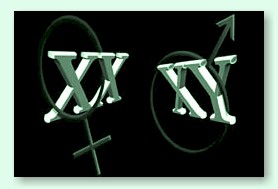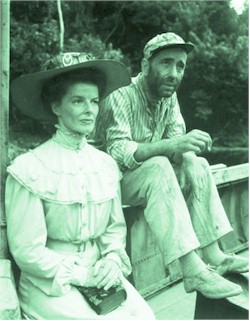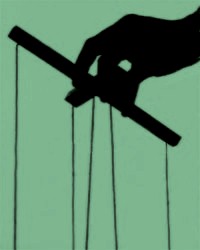 |
|
|
 |
 |
Forgetaboutit!
Love and happiness...
something that can make you do wrong, make you do right...
Love...
Love and happiness
Wait a minute...
something's going wrong
love and happiness...
love and happiness...
Make you do right... love'll make you do wrong...
make you come home early...
make you stay out all night long...
the power of love... --Al Green

What's the Difference?
In his book The Wisperings Within, author David Barish observes:
The biological difference between men and women is absolutely crucial to comprehending sociobiology's arguments for the behavioral differences between them. Natural selection dictates that individuals will behave in ways that maximize their fitness, so, clearly, different strategies will be appropriate for the two sexes, given their dramatically different biological characteristics.
Sperm are cheap. Eggs are expensive. Accordingly, females have a much greater stake in any one reproductive act. Biologist George C. Williams points out that in virtually all species males are selected to be aggressive—sexual advertisers—while females are selected to be choosier—comparison shoppers. Again, these behaviors follow directly from the biology of what it is to be male or female. For males, reproduction is easy; a small amount of time, a small amount of semen, and the potential evolutionary return is very great if offspring are produced. On the other hand, a female who makes a "bad" choice may be in real evolutionary trouble. If fertilization occurs, a baby is begun, and the ensuing process is not only inexorable but immensely demanding. In certain species of flies, copulating with a male from the wrong species results in the death of the female. The male, however, loses little. Among birds, a comparable error by the female in choosing a mate can lead to the production of sterile eggs —a potential wastage of one-fourth of her body weight. She may also be unable to breed again for a full year. The cost to the male? Again, little, if anything. Small wonder that females in virtually every species are more discriminating than males in the choice of sexual partners.
The evolutionary mechanism should be clear. Genes that allow females to accept the sorts of mates who make lesser contributions to their reproductive success will leave fewer copies of themselves than will genes that influence the females to be more selective. Accordingly, genes inducing selectivity will increase at the expense of those that are less discriminating. For males, a very different strategy applies. The maximum advantage goes to individuals with fewer inhibitions. A genetically influenced tendency to "play fast and loose"—"love’em and leave’em"—may well reflect more biological reality than most of us care to admit.
|

What do women want?
Charlie: What ya being so mean for, Miss? A man takes a drop too much once and a while, it's only human nature.
Rose: Nature, Mr. Allnut, is what we are put in this world to rise above.
--John Huston's "The African Queen"
Question: Is it our purpose to rise above nature, and are we capable of doing such?
In his book “The Moral Animal,” Robert Wright make the following points:
Much of the relevant history of our species took place before our ancestors were smart enough to ask much of anything. And even in the more recent past, after the arrival of language and self-awareness, there has been no reason for every evolved behavioral tendency to fall under conscious control. In fact, sometimes it is emphatically not in our genetic interest to be aware of exactly what we are doing or why.
In the case of sexual attraction, at any rate, everyday experience suggests that natural selection has wielded its influence largely via the emotional spigots that turn on and off such feelings as tentative attraction, fierce passion, and swoon-inducing infatuation. A woman doesn't typically size up a man and think: "He seems like a worthy contributor to my genetic legacy." She just sizes him up and feels attracted to him—or doesn't. All the "thinking" has been done—unconsciously, metaphorically—by natural selection. Genes leading to attractions that wound up being good for her ancestors' genetic legacies have flourished, and those leading to less productive attractions have not…
(Another) point to grasp before pondering how natural selection has "decided" to shape the sexual preferences of women (and of men) is that it isn't foresightful. Evolution is guided by the environment in which it takes place, and environments change…What the theory of natural selection says, rather, is that people's minds were designed to maximize fitness in the environment in which those minds evolved. This environment is known as the EEA— the environment of evolutionary adaptation. Or, more memorably: the "ancestral environment.” The question, properly put, is always whether a trait would be in the "genetic interest" of someone in the EEA, not in modern America or Victorian England or anywhere else. Only traits that would have propelled the genes responsible for them through the generations in our ancestral social environment should, in theory, be part of human nature today.
What was the ancestral environment like? The closest thing to a twentieth-century example is a hunter-gatherer society,…the idea of a single EEA is actually a fiction, a composite drawing; our ancestral social environment no doubt changed much in the course of human evolution. Still, there are recurring themes among contemporary hunter-gatherer societies, and they suggest that some features probably stayed fairly constant during much of the evolution of the human mind. For example: people grew up near close kin in small villages where everyone knew everyone else and strangers didn't show up very often. People got married—monogamously or polygamous—and a female typically was married by the time she was old enough to be fertile. — This much, at any rate, is a safe bet: whatever the ancestral environment was like, it wasn't much like the environment we're now. We aren't designed to stand on crowded subway platforms, or to live in suburbs next door to people we never talk to, or to get hired or fired, or to watch the evening news. This disjunction between the contexts of our design and of our lives is probably responsible for much psychopathology, as well as much suffering of a less dramatic sort.
To figure out what women are inclined to seek in a man, and vice versa, we'll need to think more carefully about our ancestral social environment(s)… Whatever the typical level of reserve for females in our species, it is higher than the level for males—the particular environment doesn't much matter. For this point depends only on the premise that an individual female can, over a lifetime, have many fewer offspring than an individual male. And that has been the case, basically, forever: since before our ancestors were human, before they were primates, before they were mammals—way, way back through the evolution of our brain, down to its reptilian core. Female snakes may not be very smart, but they're smart enough to know, unconsciously, at least, that there are some males it's not a good idea to mate with…
Understanding the often unconscious nature of genetic control is the first step toward understanding that—in many realms, not just sex—we're all puppets, and our best hope for even partial liberation is to try to decipher the logic of the puppeteer. The full scope of the logic will take some time to explain, but I don't think I'm spoiling the end of the movie by noting here that the puppeteer seems to have exactly zero regard for the happiness of the puppets.
|
What men want.
Because it is in the female’s interest, owing to the “unconscious nature of genetic control,” to seek from males, two things: superior genes and a reliable investment of male parental resources, nature has provided her a way of insuring both at the expense of some males. If she can trick a devoted, but less genetically superior mate into providing for the offspring of a male with better quality genes, she can improve her evolutionary fitness. Of course, the female may not consciously want this to occur, but if genes that lead to such temptations ended up being advantageous for her ancestors' genetic legacies, then such genes would have flourished.
Robert Wright notes that:
Theories involving so much subconscious subterfuge may sound too clever by half, especially to people not steeped in the cynical logic of natural selection… Whatever the reason(s) women cheat on their mates (or, as biologists value-neutrally put it, have "extra-pair copulations"), there's no denying that they do. Blood tests show that in some urban areas more than one fourth of the children may be sired by someone other than the father of record… Female infidelity appears to have a long history.
Indeed, if female infidelity weren't a long-standing part of life in this species, why would distinctively maniacal male jealousy have evolved? At the same time, (the fact) that men so often invest heavily in the children of their mates suggests that cuckoldry hasn't been rampant; if it had, genes encouraging this investment would long ago have run into a dead end. The minds of men are an evolutionary record of the past behavior of women. And vice versa.
 When it comes to assessing character – to figuring out if you can trust a mate – a male’s discernment may differ from a female’s because the kind of treachery that threatens his genes is different from the kind that threatens hers. Whereas the woman's natural fear is the withdrawal of his investment, his natural fear is that the investment is misplaced. Not long for this world are the genes of a man who spends his time rearing children who aren't his… When it comes to assessing character – to figuring out if you can trust a mate – a male’s discernment may differ from a female’s because the kind of treachery that threatens his genes is different from the kind that threatens hers. Whereas the woman's natural fear is the withdrawal of his investment, his natural fear is that the investment is misplaced. Not long for this world are the genes of a man who spends his time rearing children who aren't his…
The theoretical upshot of all this is another evolutionary race. As men grow more attuned to the threat of cuckoldry, women should get better at convincing a man that their adoration borders on awe, their fidelity on the saintly. And they may partly convince themselves too, just for good measure...
Anti-cuckoldry technology could come in handy not just when a man has a mate, but earlier, in choosing her. If available females differ in their promiscuity, and if the more promiscuous ones tend to make-less faithful wives, natural selection might incline men to discriminate-accordingly. Promiscuous women would be welcome as short-term sex partners—indeed, preferable, in some ways, since they can be had with less effort. But they would make poor wife material, a dubious conduit for male parental investment.
One can imagine courtship as, among other things, a process of placing a woman in one category or the other. The test would run roughly as follows. If you find a woman who appears genetically suitable for investment, start spending lots of time with her. If she seems quite taken by you, and yet remains sexually aloof, stick with her. If, on the other hand, she seems eager for sex right away, then by all means oblige her. But if the sex does come that easily, you might want to shift from investment mode into exploitation mode. Her eagerness could mean she'll always be an easy seduction—not a desirable quality in a wife.
Of course, in the case of any particular woman, sexual eagerness may not mean she'll always be an easy seduction; maybe she just finds this one man irresistible. But if there is any general correlation between the speed with which a woman succumbs to a man and her likelihood of later cheating on him, then that speed is a statistically valid clue to a matter of great genetic consequence. Faced with the complexity and frequent unpredictability of human behavior, natural selection plays the odds.
Just to add a trifle more ruthlessness to this strategy: the male may actually encourage the early sex for which he will ultimately punish the woman. What better way to check for the sort of self-restraint that is so precious in a woman whose children you may invest in? And, if self-restraint proves lacking, what faster way to get the wild oats sown before moving on to worthier terrain?
…The result of these conflicting aims—the female aversion to exploitation, the male affinity for exploiting—is an evolutionary arms race. Natural selection may favor males that are good at deceiving females about their future devotion and favor females that are good at spotting deception; and the better one side gets, the better the other side gets. It's a vicious spiral of treachery and wariness—even if, in sufficiently subtle species, it may assume the form of soft kisses, murmured endearments, and ingenuous demurrals…
A basic underlying dynamic between men and women is mutual exploitation. They seem at times, designed to make each other miserable.
|

The Rules
There is no question that awareness of the often unconscious nature of genetic control is the key toward understanding the forces that each gender is subject to when seeking love and happiness.
Whether men admit it or not, nature seems to have programmed them to desire sexually reserved women as prospects for marriage. They may want to date the other kind, but the girl they can’t get off their mind, is likely the one who is not easy to get.
Radical feminists, with their advocacy of sexual liberation have done women a major disservice. When women today complain that men seem unable to commit, one needs to tell them that: “they certainly can, but maybe not with you.” Somehow, someway, men’s genes are looking after their interests and investments, and eagerness on the part of a woman is pushing all the wrong buttons. Clearly sexual eagerness on the female’s part is not always correlated with latter infidelity, but natural selection plays the odds. Somehow, something deep within him is saying that marriage just doesn’t feel right with this accommodating girl. But that other one who is aloof, mysterious, difficult to attain, somehow he can’t get her out of his head; and if there is a chance he might lose her to another man, he hasn’t got a chance of escaping the spell.
In recent years, some women have bucked the tide of the sexually liberated advice columns and recognized that the collective wisdom of a great many preceding generations actually makes some sense for marriage bound girls. In 1996 authors Ellen Fein and Sherrie Schneider published “The Rules: Time-Tested Secrets for Capturing the Heart of Mr. Right.”
Through their empirical observations, these authors developed an approach for women who wanted more than endless dating without a serious marriage proposal. Though not evolutionary biologists, the authors apparently have advocated an approach to dating for women that is designed to steer a man toward a committed relationship by displaying the sort of self-restraint and sexually aloofness that would convince his unconscious genetic control mechanisms, that she is genetically suitable for investment.
Some of these rules are:
-
Don't talk to a man first.
-
Don't stare at a man or talk too much.
-
Don't go Dutch on a date or meet him anywhere. Have him pick you up.
-
Don't call him. Rarely return his calls.
-
Always end phone calls first.
-
Don't accept a Saturday night date after Wednesday.
-
Always end the date first.
-
Stop dating him if he doesn't buy you a romantic birthday or Valentine's gift.
-
Don't see him more than once or twice a week.
-
Be honest but mysterious.
-
Don't tell him what to do.
-
Let him take the lead.
-
Don't live with a man or leave things at his apartment.
-
Don't do anything else but casual kissing on the first date.
-
Don't rush into sex.
|

Looking for love in all the wrong places.
Just what is the future for a society where the immutable facts of unconscious genetic control are ignored by larger and larger segments of the population?
Organizations such as “The Alternatives to Marriage Project” claim to be advocates who “provide support and information for this fast-growing constituency” (those who chose not to marry). They report that “According to the 2000 Census, there are eleven million unmarried people living with an unmarried partner in the United States today, and this number has grown 72% in the last decade alone. Millions more people are not currently in relationships or do not live with their partner, and have no plans to marry.” Likely these numbers will be even higher in the 2010 Census.
But if our genetic foundations tell men to be wary of marriage with women who will be easy to attain sexually; if men’s minds are an evolutionary record of the past behavior of women, then we can expect to see this alternative to marriage increase. Perhaps this will become the norm; just as obesity may become the norm because of an ever increasing dysfunctional lifestyle (no linkage is implied). But becoming the norm does not lead to happiness and fulfillment in either case.
We may one day see a society in which men have no expectation of commitment (which many of them may initially think is in their interests) and where women have grown to accept it as normal. Witness that “The Alternatives to Marriage Project” already has a national 501(c)(3) nonprofit organization status (Tax Free) with the IRS (and is thus subsidized by taxpayer money) and we can see where things are going.
As the song says:
Love and happiness
Wait a minute...
something's going wrong.
|
|
|
 |
|
|
 |
|
|
 |
|
Copyright by OnHumanNature.com 2008
|
|
|
 |